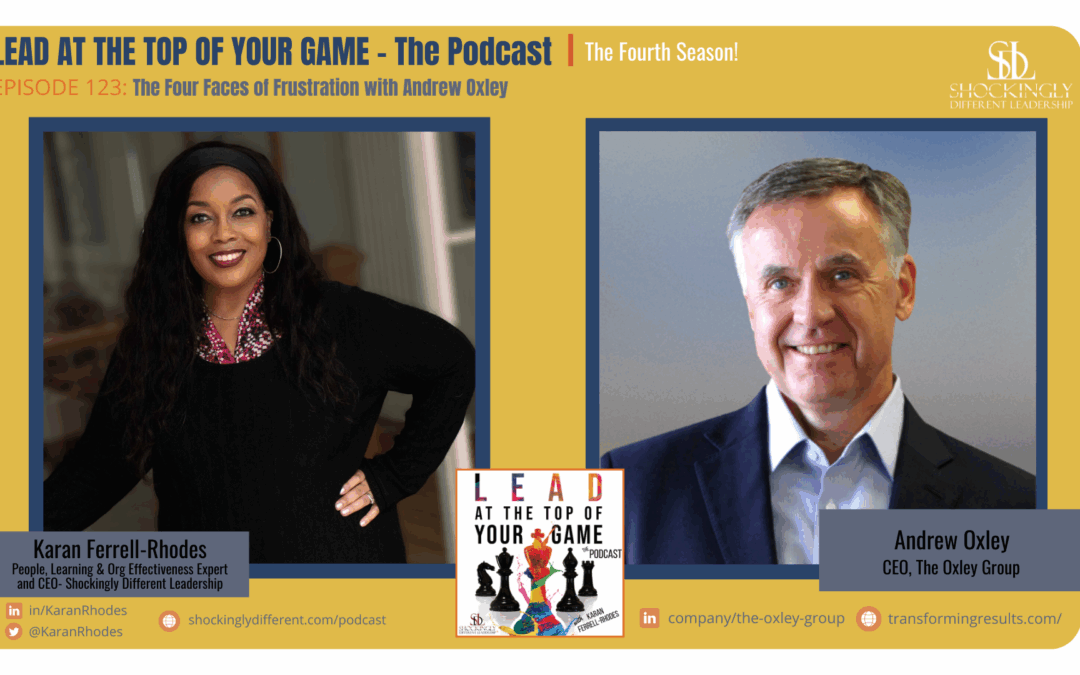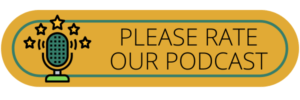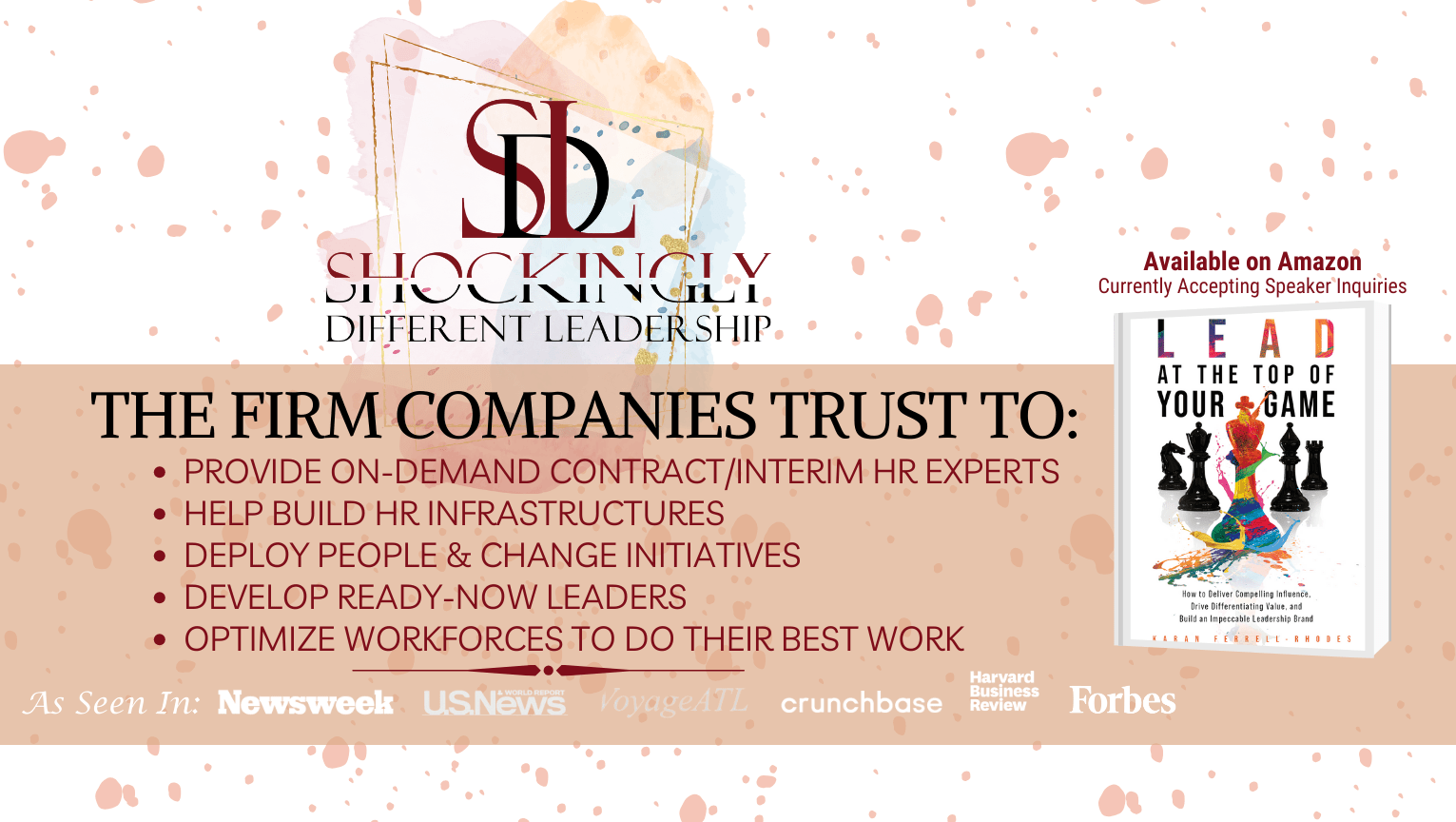IN THIS EPISODE, KARAN FERRELL-RHODES INTERVIEWS ANDREW OXLEY.
Andrew highlights how COVID-19 accelerated shifts from traditional workshops to more impactful leadership development. Andrew discusses rising employee expectations, particularly among younger generations, and the need to preserve company culture through strong leadership.
Andrew introduces his book The Four Faces of Frustration, which uses a parable to help leaders understand and manage team frustration. He also explains how the Oxley Group helps organizations achieve measurable business results through focused leadership development.
Andrew Oxley is the founder and CEO of the Oxley Group, an executive and leadership coaching firm. In this episode, Andrew shares insights on leadership and training trends.
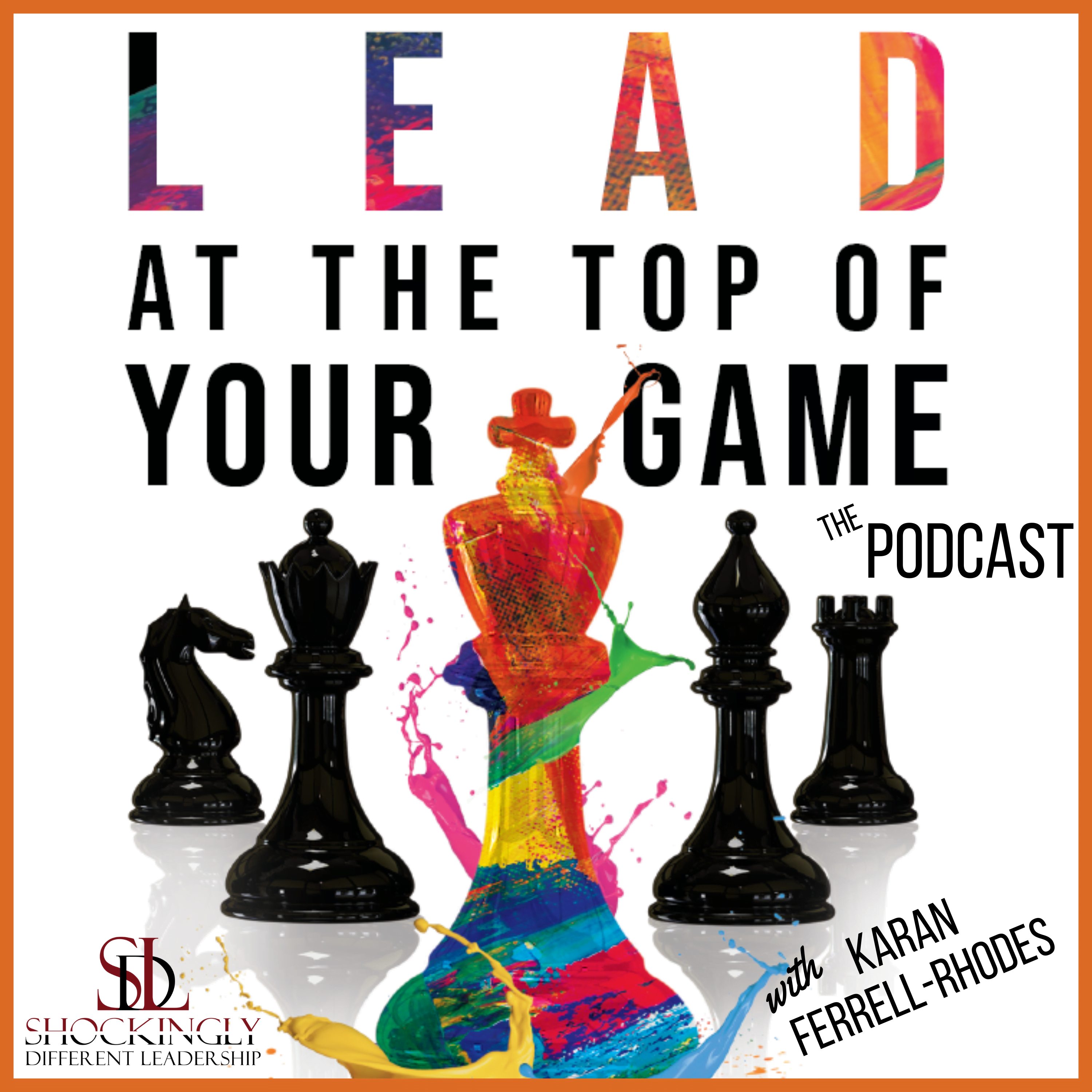
Posted by
SDL Media Team
Rather view our video podcast?

WHAT TO LISTEN FOR:
- What are younger employees asking for from their leaders?
- Why are companies moving away from traditional workshops?
- What is the book The Four Faces of Frustration about?
- What are the four faces of frustration?
- How can leaders manage different types of frustration?
- How does the Oxley Group help companies improve results?
- What is one key metric companies should focus on for improvement?
“The problem with the rat race is that you’re still a rat.”
FEATURED TIMESTAMPS:
[02:43] Andrew’s Personal Background
[03:46] Andrew’s Career Journey
[07:18] Current Trends in Leadership and Training
[12:34] The Four Faces of Frustration
[16:59] Signature Segment: Andrew’s entry into the LATTOYG Playbook: Leadership Development and Organizational Results
[28:08] Signature Segment: Andrew’s LATTOYG Tactic of Choice: Leading With A Drive For Results
[30:43] Connect with Andrew

ABOUT ANDREW OXLEY
Andrew is a nationally recognized author, speaker, and executive coach. He is the founder of The Oxley Group, an executive and leadership coaching firm focusing on bottom-line results. Their clients include Airgas, Farmer’s Insurance, Gold Creek Foods, Progressive Insurance, Coca-Cola Enterprises, Turner Broadcasting, The Weather Channel, Mohawk Industries, CNN, AIG Insurance and COX Communications.
Combined, his programs and books have reached and improved the lives of tens of thousands of people. His mission is to help his clients understand and deal with the complexity they are experiencing, returning their days and business to a state of simplicity while accelerating their business results.
LINKS FOR ANDREW:
- Website: transformingresults.com/
- LinkedIn: linkedin.com/company/the-cxley-group
- Facebook: facebook.com/TheOxleyGroup
- X: x.com/AndrewOxley
PEOPLE AND RESOURCES MENTIONED:
- The 4 Faces of Frustration: How to Turn Frustration into Delight: amazon.com/Faces-Frustration-Turn-into-Delight
ADDITIONAL RESOURCES FOR YOU:


Episode Sponsor
SDL is the go-to firm companies trust when needing to:
- supplement their in-house HR teams with contract or interim HR experts
- implement leadership development programs that demonstrate an immediate ROI and impact on the business

Episode 123 | The Four Faces of Frustration with Andrew Oxley
Andrew Oxley 00:00
When you’re growing, you have to be growing leadership within your team, because if you don’t, you have to hire leaders from outside and well, that’s sometimes the right thing to do. Dilutes your culture in general. If you do too much of it and you end up with a company that you did not you don’t recognize anymore. That’s right, so you have to find a way to develop the leader. So I would agree with you. I don’t think companies have given up on training and development. I think they’re trying to evaluate it with a much more critical eye as to, are we getting what we want from this training, rather than looking at the old methodology used to be, you know, butts in seats, how quickly can we or how cheaply can we train people?
Voiceover 00:05
Welcome to the “Lead at the Top of Your Game” podcast, where we equip you to more effectively lead your seat at any employer, business, or industry in which you choose to play. Each week, we help you sharpen your leadership acumen by cracking open the playbooks of dynamic leaders who are doing big things in their professional endeavors. And now, your host, leadership tactics, and organizational development expert, Karan Ferrell-Rhodes.
Karan Rhodes 00:36
Hello, my superstars. This is Karan, and welcome to another episode of the lead at the top of your game podcast. We are just over the moon today to have a fantastic guest to present to you. His name is Andrew Oxley, and Andrew is the founder and CEO of the Oxley Group, which is an executive and leadership coaching firm that focuses on bottom line results for their organizations. Now, Andrew’s insights into the dynamics that drive business performance are woven into the fabric of his book that’s called The Four Faces of Frustration. What a fantastic name for a book. I cannot wait for us to learn more about what he writes about those four faces of frustration, because I know we’ve all experienced them in one way, shape or form before. But he has shared that in the book, that he explains the reasons why companies and their leaders struggle to create customer loyalty and employee engagement. So welcome to the podcast, Andrew,
Andrew Oxley 01:38
Well, thank you very much. Karan, I’m glad to be here.
Karan Rhodes 01:41
Oh, we’re so happy to have you. As I said, your book really touches on a hot button that is that constantly goes on in companies and organization, and it has for hundreds of years. But we’re very excited to hear your perspectives, but before we do so, we always love to learn just a little bit more about our gifts. So for just as much as you feel comfortable, can you give us a sneak peek into your life outside of work?
Andrew Oxley 02:06
Yeah, absolutely. So I live just northeast of Atlanta with my beautiful wife and our four children, and we live on up here on Lake Lanier. So love spending time outdoors and enjoying all the activities that we can get up to on the lake.
Karan Rhodes 02:24
Yeah, that sounds fantastic. And many of my listeners know that I, too am based in metro Atlanta, a bit of ways from Andrew, but we’re all in the Atlanta, Metro Atlanta family, I love to say and Lake linear is a beautiful place, so I have been there many times, and love their buffet. Andrew, they have a fantastic seafood buffet. I’m sure you’ve partaken in that a bit, but yeah, Atlanta’s a great place to be.
Andrew Oxley 02:51
Yes,
Karan Rhodes 02:52
All right. Well, thank you for sharing that with us, and let’s kind of jump in to our topic today before we go to the book, can you share with us just a high level of your professional career and what led you to starting the Oxley group?
Andrew Oxley 03:09
Yeah, well, so I actually came a very circuitous route to the career I’m in today. I like to say I have none of the traditional qualifications that you would expect someone to have in an executive coaching position. I actually am a recovering engineer. I’m a little embarrassed to say that, but I am, and I was actually in the 25% of the class that made the top 75% possible, and I’m very proud of that. But my final year of engineering, School of Business professor took me aside and said, hey, you know you should go sell something technical, because you’re probably really good at sales, but you’re not going to be a great engineer. And I, I’m so grateful for him. His name was Professor Jack Lemmon. So I went and started selling commercial air conditioning in Toronto for a firm called train Canada. Train the obviously a subsidiary of the of the train USA, and I worked there for seven years, and that was a it was a great career enabled me to experience all sorts of personal success early in life, I like to say it accelerated my progress towards my midlife crisis. One day I woke up in Toronto, and in Toronto or in Canada, the equivalent of the Wall Street Journal is the Globe and Mail. And so I picked up the Globe and Mail this one particular morning. You may remember newspapers. They used to deliver them, you know, to this. So I picked it up this one particular morning, and in the bottom right hand corner, they always had this thing called your morning smile. And it was supposed to get your day off with a hop in your staff. And this particular morning, the morning spot is the problem with the rat races. Even if you win, you’re still a rat. And I remember shaving that morning, looking at myself in the mirror and thinking, I’m just going to be a big fat rat. That’s all I’m going to be. I’m going to be a big fat rat sitting up here in Toronto. And I made a decision. I wanted to change my life. And. Right now, the reason I made the decision was incorrect, but the decision was correct. I actually thought the problem was my job. The problem was not my job. The problem was the way I was executing my role within that job. And but I’m glad I made that decision, because it embarked me on a journey to try to understand how to have balance in your life, how to how to have great business results, and still, you know, enjoy all that life has to offer, because a lot of times we experience all sorts of success, but we don’t really experience full success, because it takes so much out of us, and we arrive home at the end of the day exhausted and tired and stressed and frustrated. So I embarked on this, this career, to try to figure it out for myself and and now I’ve been able to help literally 1000s of leaders understand how to experience true success in their life, drive organizational performance, while not feeling that the end of the day like they’re just spent
Karan Rhodes 05:54
Okay, So Andrew, if you have figured that out, you need to put that in a bottle and sell it, because he will become a trillionaire 100 times over. So I’m very, very curious to learn about your insights and so. But before we go that, I’m just curious, since you, you know, are such an active coach and this crazy dynamic world dynamic that we have right now, you know, with the evolutions and technology and workforces and how work gets done, and the increasing challenges of leaders to kind of lead through all of this volatility and change, I’m curious what maybe one or two top level trends you’re seeing from your coaching clients right now that they’re really trying to tackle,
Andrew Oxley 06:41
yeah, yeah. And you’re and you’re absolutely right. You know, COVID actually packed about 10 years of change into 18 months.
Karan Rhodes 06:47
And sure did.
Andrew Oxley 06:49
It was trends we were seeing in the marketplace very for a long time before that. But what was sort of probably marginally acceptable is no longer acceptable employees. And it started with the, you know, the young generation, you know, they started not accepting things that maybe my generation thought were normal, and you just had to pay your dues. And they’re like, no, no, we don’t. We want to move fast. We want to learn. We want to know what you’ve what you plan on doing to help us develop. And what we’ve seen is that this is cascaded up through the generations now, and we’re seeing it’s not a generational issue. Now, I will tell you, most leaders that I talk to, you know they their favorite saying right now is young people today, yeah. And I’ll just say two things about that. First of all, I’m pretty sure our parents said the same thing about us,
Karan Rhodes 07:31
Yes.
Andrew Oxley 07:32
And second of all, it’s not just young people. And complaining about young people is like yelling at the wind.
Karan Rhodes 07:38
That’s right.
Andrew Oxley 07:38
The wind is no different, and you’re exhausted. So, so that’s one big change we’re seeing, that you cannot lead people the same way. You must lead them differently. And to be perfectly honest, is the way you need to lead them is nothing new. It’s the way we should have been leading people all along. It’s just now, it’s an economic mandate where leaders could sort of get away with it for a while, but you can’t anymore. You really cannot. So that’s one big change we’re seeing in the marketplace right now. The other one that we’re seeing in the marketplace is that that organizations have given up on traditional training and development, and they realize that the workshop model of, you know, butts in seats and how, how cheaply can we train people just is not effective. So they’re they’re really working hard on on evaluating their training systems to see if they’re truly effective, and are they delivering the actual results we’re looking for.
Karan Rhodes 08:29
I see that as well quite a bit. And there, what’s interesting of I found is that, you know, most companies are not necessarily looking to eliminate all training. They’re just trying to reimagine or re think how to best leverage the that investment of those dollars to truly impact the organization. And they’re not totally sold at all training is the right way to go, but they’re still looking for solutions or approaches, I guess. Are you seeing that too.
Andrew Oxley 09:04
Yeah, I would completely agree. I mean, training and development is critical to the success of organizations, right and right? Most of the clients we work with are very high growth companies, and when you’re growing, you have to be growing leadership within your team, because if you don’t, you have to hire leaders from outside and well, that’s sometimes the right thing to do. Dilutes your culture in general. If you do too much of it and you end up with a company that you did not you don’t recognize anymore. That’s right, so you have to find a way to develop the leader. So I would agree with you. I don’t think companies have given up on training and development. I think they’re trying to evaluate it with a much more critical eye as to, are we getting what we want from this training, rather than looking at the old methodology used to be, you know, butts in seats, how quickly can we or how cheaply can we train people? And usually, by the way, there’s nothing wrong with that training. It’s not that the training is bad or the trainers are bad. The. Problem is that, if you just take the idea of leadership, for example, leadership is not complicated in concept. It’s complicated in application. And if you put someone in a classroom for three hours and you you teach them some stuff that they probably already knew, they’re like, Yeah, great. The problem is, I don’t know how to do that when I get back up a job
Karan Rhodes 10:21
That’s the rub…
Andrew Oxley 10:22
And, there in lies the rub.
Karan Rhodes 10:23
So you took the words right out of my mouth. We’ll let you answer our signature question closer to the end of the podcast, that whole research came out of trying to understand the root cause of why leadership development interventions did not have the results that organizations and leaders wanted them to and what it really boiled down to is that we just do not teach or support leadership execution, and that’s a whole nother competency skill set that is very important. You know, you can’t just teach people skills and then leave them be in that hope that they figure out you know how to do it in their day to day roles, or they learn the skills because they come become rusty because they just don’t know how to apply them. So the whole point of teaching them how to execute on the skills that they have learned and being there to know when to pivot or change is a very important skill set that a lot of companies just don’t, don’t focus on. I completely agree, yeah. Well, let’s turn to your wonderful book, the four faces of frustration, how to turn frustration into delight. And I know we all would love to to know more about that, and I was fascinated that you wrote the book as a parable. And we all humans love stories, but share with us a little bit more about what inspired you to write the book, and maybe some top tips or thoughts that came out of the book that you would love to leave with our listeners.
Andrew Oxley 11:57
Yeah. And I guess one of the reasons why it’s ironic that I do what I do today is because I would have been elected the most likely to fall asleep during training in my previous career. And part of the reason was it’s usually taught by someone who knows nothing about what you do, and they’re they don’t, not even they’re using like examples that aren’t relevant. And so we knew we were gonna do something different. So a lot of the time we spend is how to create what we call mental models, or models around leadership concepts that are very memorable. And one of my favorite quotes around that is, you know, you know, Andy Stanley runs a big church here in Atlanta. Is this great saying says, you know, what happens down the hall will always beat what’s hanging on the wall. And a lot of times we hang the sayings up and stuff like that, but we’re not modeling the things. And I find leaders be frustrated. They’re frustrated because they know what they’re trying to communicate to their people. They know what they want their people to do differently and so, but they don’t have a memorable way of of teaching it to people. So the force it faces of frustration was a model we came up with that is memorable first of all, and we teach leaders, both from an employee and a customer standpoint, how people act when they’re frustrated. And the the simple answer to that question is that when people are frustrated, they get they get mad, right? And that’s true to an extent. Three of the four styles transition through anger, though into some other behavior. There’s one particular style that stays angry, and so if you know anybody who’s super angry, we call them reds. They look angry a lot. In their defense, they’re really not angry. They’re they’re frustrated that things are not moving fast enough. Unfortunately for them, they’re never moving fast enough. You know, it’s always going to be moving faster. So they’re super easy to identify. And so we then we teach in the book how you deal with those people. How do you interact with them? Because when people are frustrated, it’s easiest to understand what their communication style is. So So Rhodes just stay angry. The second one is yellows and and yellows, when they’re frustrated, they might transition through anger, but then they start becoming very optimistic and telling you how it’s all gonna be fine. We’re gonna work through this and willing to put the lipstick on the pig and tell you how everything’s gonna be awesome. And third one are the people who just start asking tons of questions that we call them blues, and they just start drilling down and asking you, and they get a bad rap for being pessimists, because they are focused on all the things that could go wrong, but in their defenses, because nobody else is focused on that right. And the last one are what we call the greens, and they just get quiet. They just stop…
Karan Rhodes 14:30
Quiet in a good way or quite in a bad way?
Andrew Oxley 14:31
Depends. But you know, these they just stop talking because they’re like, no one’s listening to me. And what’s the point of having a conversation if no one’s going to listen. So the whole concept of the book is, look, you probably have people you manage that are that fall under one of these categories, or maybe many of these categories, and if you utilize the strategies that will work with you, they could very well be the exact opposite of what that person needs from you as a manager. And so because of that, you’re actually mismanaging, not out of any deliberate methodology on your part, just because you don’t know so and the same is true of your customers, right? So we actually did a large scale project at Progressive Insurance around this particular concept, and we trained most of their customer service supervisors who, you know, handle the incoming calls for when people have got a claim, and we trained them how to recognize in a stressful situation like that, how that person wanted to be served. Because we found that people tend to serve others the way they want to be served. ,
Karan Rhodes 15:36
And that’s not always the correct way…
Andrew Oxley 15:38
Well, no, you know, and you…just think aboutthe last time you called into a customer service but you don’t have customer service centers anymore, but when they used to have them, when you called in, right? Sometimes you got someone on the phone and they were awesome, and sometimes you got somebody on the phone and they just didn’t, you just didn’t connect with right? They were probably trying, but they were just not doing a great job.
Karan Rhodes 16:00
Very fascinating. So when you go in and do your I guess, well, let me ask you, maybe not as soon. So you teach organizations the model, and then you look at their business operations or their jobs and apply that model to stressful situations that they encounter, is that the idea?
Andrew Oxley 16:22
Well,he four faces of frustration is a model that’s nested within our leadership development process. So
Karan Rhodes 16:27
Okay.
Andrew Oxley 16:28
What we typically do is, whether it be an organization, a department or an individual, what we want to really understand is, and this is probably where we’re different than most leadership development groups. We want to know from a bottom line, why do you care? Like, why do you care if your leaders are developed, like, what is it? What’s What’s the business result that should change if your leaders are more effective and better trained and skilled? And that’s not a hard question for most operational leaders to share. In fact, one of our clients, the project we were just talking about progressive, they wanted to increase their net promoter score, which is a very caustic measure, of course, of customer service, right? And so to say, Fine. So if we’re effective in this project, your NPS score should go up, all right. Now, most trading groups do not want to commit to that kind of operational result, you know, because that’s dangerous
Karan Rhodes 17:19
Then you’re not meeting it, or may not being able to measure what the ROI is, yeah.
Andrew Oxley 17:24
So we want to know, like we want to know, what’s that operational result. And then we want to figure out, well, what are the leadership skills that would support a change in that? What do we need the employees doing differently? What are the leaders need to be doing differently? How do we train them to do that? And then we measure the change at all those different levels, ultimately, in terms of the business result. And when we do that with organizations, interestingly enough, the problem is not that they don’t know what they want to measure. The problem is that they want to measure too much stuff. I always say they’re like, NASA, they’ve got dials everywhere. And yeah, but what’s the one thing? What’s the one thing that you want to change? And like, they all have to change. And I’m like, Well, how long have they all been in the tank? And they’re like, well…
Karan Rhodes 18:03
Great question!
Andrew Oxley 18:04
Y ou know, at least five years. I’m like, well, and it doesn’t all have to change right now that, you know
Karan Rhodes 18:09
That’s right!
Andrew Oxley 18:10
Now, interestingly enough, the leadership behaviors that improve one metric. If you’re truly working on foundational leadership behaviors, all the metrics end up improving. So it’s not like just one does, but we want to measure one to see if, because if you try to measure five things, you just dilute your effort across different areas.
Karan Rhodes 18:27
You get everybody focused on that one North Star goal,
Andrew Oxley 18:30
Correct.
Karan Rhodes 18:31
And then see, I’m just, I’m sorry, I’m thinking and talking at the same time because I’m so impressed. Yeah, you get them all focused on that, that same goal, that same North Star, and that’s just that instant ROI, and to your point, the other metrics will naturally improve, because behavior has changed in a positive way,
Andrew Oxley 18:49
Correct. Yeah,
Karan Rhodes 18:50
To change the most critical measure that they’ve identified. I love that. It’s just simple, right? It is very simple. And you know, when you were going over the four I was trying to picture myself. I’m usually a glass half full kind of gal anyway, but I tried to think about situations when I was angry with something that was going on at work, and if I had to put it on myself, I would guess I would be somewhere between a yellow and a blue, but probably more of a yellow.
Andrew Oxley 19:21
You are definitely a yellow.
Karan Rhodes 19:23
Am I yellow?
Andrew Oxley 19:24
Yeah, you’re completely a yellow, by the way.
Karan Rhodes 19:28
So if you were my manager and you knew that I was a yellow, and you knew I was angry about the new implementation of a new technology, what might be one way to approach me if I’m a yellow?
Andrew Oxley 19:45
Yeah, so the one of the biggest challenges with yellows is, I love the fact you’re yellow. I gotta let the yellow in my personality, too. Karan, but yellows are attracted to shiny objects
Karan Rhodes 19:54
Yes, I am!
Andrew Oxley 19:55
They sort of bounch around a lot, you know, and and so what we have to recognize is with the yellow. L is, they’re very verbal. They have to talk things out, to think them out quite often.
Karan Rhodes 20:03
Yes! Oh my God, that’s me!
Andrew Oxley 20:06
they think and talk at the same time. So, so if you say, you know, just go away and think about that. The the yellow’s like, I don’t want to go away and think about it. I want to think about it with you.
Karan Rhodes 20:15
Yes!
Andrew Oxley 20:15
Don’t leave them alone. They like to hear how they’re doing
Karan Rhodes 20:21
Yeah, yea,
Andrew Oxley 20:21
Some of the other behavioral styles. If you compliment them too much on how they’re doing, they’re like, What do you think I’m incompetent? Like, why do you think I need to be told? I don’t need to be told. So it’s not just when you’re frustrated that you it’s actually when people are frustrated that it’s easiest to see their their communication styles.
Karan Rhodes 20:38
That’s true.
Andrew Oxley 20:38
But it’s actually that communication style is, is there? And obviously it’s not the whole of who you are. Like, yeah, you’re a very complicated person. You’ve got your your background, your skills, your education, your value, set your there’s, there’s so much that makes up Karan, right? So this is just like a little, little piece of the puzzle, but it’s an important piece, because it’s actually ends up being the easiest thing to manage with someone, is that you just modify your pace that you talk to them at, and you modify how much you’re engaging with them on the task versus people access as well. You know, yellows are big people, people. They love to meet people. They love to engage with people. They love to move quickly. They’re not big on detail. So one of the things we talk about in the book is we talk about the maturity spectrum on communication style, because every communication style has strengths and weaknesses. And you’ve probably heard the Peter Principle, right, that you get promoted to your level of incompetence and and we have a different view on that. We actually say that what actually is happening when someone’s promoted to their level of incompetence is that they have not developed the requisite skill to offset their weaknesses. So for a yellow like you, share that with me, it’s attention to detail quite often, right?
Karan Rhodes 21:57
Yes. Very much so.
Andrew Oxley 21:58
So, so
Karan Rhodes 21:59
I have people on my team that I’ve hired that has a detail to balance me out.
Andrew Oxley 22:04
So, either you have to have the people or you have to have the systems. Because, yes, now every communication style has different weaknesses, but if you are a yellow and you haven’t developed that skill and that knowledge and either having the people or the systems, it’ll bite you in the butt eventually, and undermine your success. So it’s not, it’s not necessarily that you’ve reached a place you can’t operate. It’s that you’ve not, you’ve reached it without developing the requisite skill to support that, that next step in success.
Karan Rhodes 22:31
Absolutely. Andrew, I appreciate you letting me put my own self on the hot seat. What I love to do as much as we can on the podcast is kind of bring it home to people on get them curious about learning more. And I don’t mind putting myself out there, and I will share when I put my coach hat on. If I was coaching me, I would also, and I was I knew that I was a yellow I would also try to as a leader, help me find my play to help assist in whatever this challenge or frustration or situation is, because I’ll just talk about me for yellows we want that’s why we turn to optimism so quickly. We want to be part of the efforts, but we want to make it for good, and we want to find quickly how we can personally contribute, or how we can help the team contribute to get to a better place, and so the leader can recognize that in their individual they can coach them one on one to give them a bit more hope, focus, and help them through whatever they’re tackling. Correct or no?
Andrew Oxley 23:40
Absolutely, absolutely
Karan Rhodes 23:41
We’re co-coaching Karan here,
Andrew Oxley 23:42
Yeah. And while that’s true, there would be another employee where that would be the opposite of what they want,
Karan Rhodes 23:49
It’s quicksand for. They would hate that.
Andrew Oxley 23:51
They know, and they’re like, yeah, why are you bugging me? Just let me go do my work. There’s at least two of the communication styles. What they want from their boss is their absence, which is, leave me alone and let me do my job. You know, when their boss shows up in their office, it’s like, what I do wrong?
Karan Rhodes 24:05
Let me be me, leave me alone.
Andrew Oxley 24:08
You know, in fairness, we don’t just usually have one of these colors that make us up. Usually you have at least two, sometimes three, but little one is what we call our Achilles heel. It’s the person that when we have to spend time interacting with people with that color, it actually saps us of energy, and we tend to do the opposite of what’s necessary. I did a large scale study with a group one time. Did a couple of them, but one of them was, I always ask, who thinks they’re married. We call it not the Achilles heel, because that would be rude, but we call it the shadow, you know. It’s a shadow the people you know, it’s interesting. A lot of times we marry into our shadow. We marry the person that is very different than us, because it’s super exciting at first, and then, if you’re not careful over time, we stop valuing that difference. Yeah, we start seeing. Why do you do that? Well, I always did it. Well, no, you didn’t. Well, they did maybe, or maybe they modified a little bit at first, but, but that’s just who they are, right? When I first started studying this, my, you know, this is many, many years ago, I brought my I did a report, and I was putting it together, and I brought it home, and I showed it to my wife, and I said, read this and tell me if you think this is me. And she said she was reading it, and she looked at me, and she reading it, she looks at me and she says, Wow, so this is you. And I’m like, that’s what I’m trying to figure out. She said, Well, I thought you were just trying to piss me off sometimes.
Karan Rhodes 25:34
Oh. That was her aha moment.
Andrew Oxley 25:37
She’s like, This is who you are. And I’m like, yeah, why would I ever want to annoy you? And she’s like, she’s like, I don’t know, but you’re really good at it. Sometimes,
Karan Rhodes 25:46
Oh, bless her heart!
Andrew Oxley 25:48
this is what happens in our most important relationships in our life. We don’t sometimes understand that, that we’re trying to make things better and we’re making them worse we are. Happens at work, happens at home, happens in the organizations we associate with, and yet you could have, in fact, some of your deepest, most valuable relationships will be with people who are so different than you. And this is already true in your life, and it’s true in everybody who’s listening to life. So it’s not that you can’t get along with people in your shadow. You already do. You just have a relationship with them now, but when you first meet somebody, you have no relationship. All you have is the tension that you’re not acting the way that they expect you to in the moment.
Karan Rhodes 26:29
Absolutely well. Listeners, you know, if you’re not online right now, going to Amazon trying to find this book, The Four Faces of Frustration. I don’t know what else will inspire you, because I am just fascinated with Andrew’s model and how he weaves that into the larger leadership development space. But sorry, Andrew, we’re running short on time, but we cannot let you sneak out of here without asking you our signature question. And we already talked about the research, but out of the seven buckets leadership execution that came out of our research survey, the one that really resonated with you, you so kind to share, was leading with a drive for results. Yes, and for my new listeners out there, a drive for results is just what it sounds like. It’s all about being very focused and tenacious, about be ensuring that your end goals are are achieved, even if you have to pivot along the way. So curious minds would love to know. Andrew, why did leading with a drive for results really resonate with you?
Andrew Oxley 27:31
Yeah, and thank you, Karan, for that. And, and, and, you know, when I looked at your model, I was like, well, it’s not one, right?
Karan Rhodes 27:38
I know. It’s all seven!
Andrew Oxley 27:40
It can’t just be one, but if I was going to speak to one, I would say that as a leader, you have to have a drive for results, and the thing that will get you in trouble, the fastest is not getting results. Now, the caveat to that is that the results come as a function of doing a lot of stuff, so you have to have that drive for results. But the drive for the results has to be like, that’s the thing you want, but the stuff you do is going to change based on what you’re trying to achieve. So you can’t it’s like the measuring stick. So you got to have it. You got to have that drive. The most successful leaders I see have that drive. And wrap it up like this. One of my first mentors was a gentleman by the name of Bob Proctor, and he’s no longer with us, but Bob was a giant in the personal growth and and development space, and he had this great saying. He said, profit is not the purpose of any business, but it is the first order of business. In other words, you have to make a profit. You have to get the business, don’t you don’t get to stick around, but it’s not the purpose. And so as leaders, what I would challenge your audience to think about, well, what is my purpose like? Why am I doing what I’m doing? If you’re doing it just to get results, then you’re probably not going to lead very effectively, especially in the new environment we find ourselves in, with people who are looking for purpose. And you know, the research shows that young people today would work harder, will will work harder for a purpose than a paycheck? Absolutely no, don’t get me wrong. They want the paycheck.
Karan Rhodes 29:08
They want to pay the bills. Yeah.
Andrew Oxley 29:10
They want to know why. Why am I doing this? Which just somebody who’s maybe my age is like, what do you mean, Why? Just do your job?
Karan Rhodes 29:17
Just do it!
Andrew Oxley 29:18
Leaders who say that to me, just do your job, I’m like, they will if you connect it to a higher purpose of why it’s important, like, like, and so that’s a lot of the work we do with clients, is helping them figure out, look, pull out from within, because it’s already there, right, right? How do we connect the purpose to the results? Because when you do that, people will be inspired and want to be engaged and want to work hard, and you won’t have to worry about a lot of the stuff that you’re trying to do in the background.
Karan Rhodes 29:45
They’ll come naturally. Well, awesome. Andrew, well, we, you know, we’re going to have a ton of information about you, your company and where to find you in our show notes, obviously, but I always love to give just a tad a bit of air time to you to let our listeners know and hear. Are on the spot where they can find and learn more about you, the Oxley Group and how to get your book.
Andrew Oxley 30:05
Yeah. So the book is on Amazon. So if you go to Amazon, you search for The Four Faces of Frustration, How to Turn Frustration Into the Light. You’ll find that there, we’re on LinkedIn, Andrew Oxley. We’re also on Facebook, the Oxley group. You can find us in all sorts of different places, and if you want more information on us, send us an email at info@transformingresults.com it’s always very confusing if you, if you put the Oxley group.com and it’s going to pull up a defense contractor that is not us, we’re in competition with them for that particular domain. So we put our domain as transformingresults.com and all sorts of information, free blog articles up there. One of our favorite ones that people are downloading right now is how to make the subjective objective, because a lot of times people are trying to provide feedback to people, but it’s subjective in nature. It’s not something you can put a hard measure on, and so we have an article up there about how to provide subjective feedback. So if we can help move your audience in any way, we’d love to do it.
Karan Rhodes 31:08
Oh, that sounds amazing. All right. Well, thank you so much, Andrew, for the gift of your time. This has been a blast. I took a million notes. I’m sure my listeners did as well, and we so appreciate you coming on the podcast.
Andrew Oxley 31:23
Thank you, Karan.
Karan Rhodes 31:24
And thank you to listeners for the gift of your time as well, because we know there are literally millions of other podcasts out there that you could be listening to, and we do not take your patronage lightly. All that we ask is that you please subscribe to our podcast and share it with just one friend, because by doing so, it’ll help us all to better lead at the top of our game. Thanks so much, and see you next week. And that’s our show for today. Thank you for listening to the lead at the top of your game podcast, where we help you lead your seat at any employer, business, or industry in which you choose to play. You can check out the show notes, additional episodes, and bonus resources, and also submit guest recommendations on our website at leadyourgamepodcast.com. You can follow me on Twitter, Facebook, Instagram, and LinkedIn by searching for the name Karan Rhodes with Karan being spelled K a r a n. And if you like the show, the greatest gift you can give would be to subscribe and leave a rating on your podcast platform of choice. This podcast has been a production of Shockingly Different Leadership, a global consultancy which helps organizations execute their people, talent development, and organizational effectiveness initiatives on an on-demand, project, or contract basis. Huge thanks to our production and editing team for a job well done. Goodbye for now.

Want to be a Podcast Guest?
Check out our guest qualifications and submit our brief form to be considered.
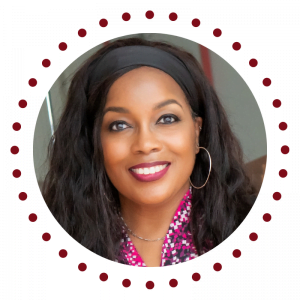
Want Karan to be Your Podcast Guest?
- Blended Workforces & the Gig Economy
- Critical Execution Tactics of High-performing Leaders
- Entrepreneurism & Leading Your Business

Want to be a Podcast Sponsor?
All sponsorships come with a featured spot on show notes pages.
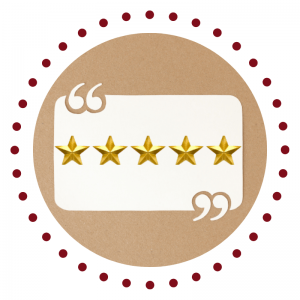
Like the Show? Please Leave a Review
If you like the show, it would mean the world to her if you left a quick review.
Your word is golden, so a HUGE thank you in advance!

#KeepInTouch
via our podcast alerts
Subscribe now to discover why thousands of monthly listeners who are passionate about doing their best work prioritize time each week to listen to the Blended Workforces @Work podcast.
#AboutSDL
#WhereToFindUs
MAILING
4480-H South Cobb Drive
PMB 219
Smyrna, GA 30080
PHYSICAL
2121 NewMarket Parkway
Ste. 108
Marietta, GA 30067
#ContactOptions
Customer Service Email:
service@shockinglydifferent.com
Call or Text:
770-384-1103
#Office Hours
MON-FRI
8:30 AM – 6:30 PM
Weekends By Appointment

